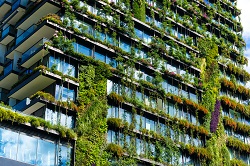Europe takes the lead in building urban resilience
By the time TURAS, a five-year EU-funded project aimed at making cities better, greener places to live, ended in September 2016, it had produced a wealth of results, some planned, whilst others were unplanned but pleasant surprises nonetheless. Back in 2011 the project brought together 32 organisations from 13 countries – academic institutions, local authorities and SMEs – to address climate change and mitigation, explore how to build green infrastructure, and examine how cities grow. ‘The project sought to devise mechanisms and toolkits for changing behaviour to build resilience,’ says project co-ordinator Dr Marcus Collier. “Many solutions were devised and tested – all of which would make urban living more tolerable, equitable and sustainable.’ Flood management and green roof construction solutions One such example is a system for managing floods designed by TURAS partners in the Netherlands. The resulting strategy has been mainstreamed in Rotterdam as a part of the planning and city management process. Local residents now not only have a stronger say in how to manage floods but public awareness of the issues and possible solutions has also increased. Project participants in Ljubljana, Slovenia, are now using the strategy to help design their own flood management scheme. The Ecomimicry toolkit is another key result from the project, a green infrastructure design toolkit intended for green roof construction and maintenance, but also useful for designing small, pocket parks and landscaping in new housing and industrial estates. It mimics the biodiversity which can be lost when brownfield sites are built upon. ‘Ecomimicry allows planners, designers and users to retain biodiversity within new developments,’ says Dr Collier. TURAS has looked at ways of getting cities to grow in more balanced ways. In the London Borough of Barking and Dagenham, the team has worked with stakeholders to devise a public private partnership for managing urban green infrastructure such as rain gardens. Surprising results Other results were unexpected. This includes the decision to draw on the project’s many co-created and co-designed ideas to set up Osmos. Based at the University of Stuttgart, this spin-off company works to facilitate collaborative planning in contentious areas. Another surprise was the success of the Green Living Room. This used plants and green wall gardening techniques to create a green comfort zone in a heavily built-up area of Ludwigsburg, Germany. It has now attracted orders from cities in Europe and China. Helix Pflanzen, the SME involved, has since doubled its size and scaled up its international programme. During 2016, a mobile version has toured European cities, giving people in Bonn, Brussels and London the chance to see what green infrastructure can look, feel and smell like. The project’s overall aim of building urban resilience, defined by Dr Collier as ‘a repository of strength of knowledge that can be drawn upon in times of need’, is important. The resilience of individuals and communities comes to the fore when sudden, shocking events occur, such as when people work together to recover from an earthquake or a flood. ‘However, as we become more urbanised and our communities become ever more complex and perhaps distant, resilience may dissipate… in responding to newer, more complex challenges such as climate change, we need to build new resilience – a capacity to tolerate, adapt and move on,’ Dr Collier explains. Pioneering new methods TURAS has used new methods as well as innovative results. Its twinning method, bringing together three kinds of organisation, has become a mainstream approach in Horizon 2020 proposals. Five years ago this was not the case. “There was no rulebook… so TURAS wrote it!” says Dr Collier. The decision to involve SMEs was also ahead of its time. ‘We knew that whatever solutions were to emerge, there would be opportunities for exploitation and scaling up. SMEs are in the best position for this,’ says Dr Collier., ‘We hoped that our SMEs would build European expertise and bring it to a global scale, making Europe a leader in devising resilience solutions.’
Countries
Ireland



